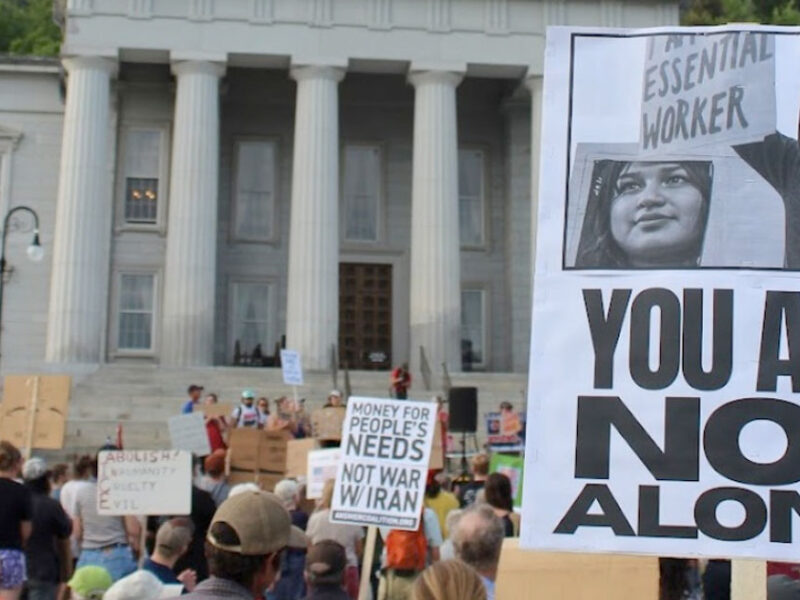Burlington City Hall was built in 1928 under the supervision of Mayor Clarence Beecher. The brick, marble, and granite all came from Vermont quarries, likely those in and around Barre. At the time, socialism and solidarity were still thick in the air among Barre’s unionized quarry workers, who the prior year had laid down their tools the day the anarchists Sacco and Vanzetti were executed in Massachusetts.
Many of City Hall’s stones were carved by socialist hands. This fact can appear inspirational to leftists who desire to take power within. But let’s not forget who directed those hands: capital. The multinational architectural firm McKim, Mead & White ordered the precise dimensions. The quarry owners oversaw the drilling. The local contractor supervised its construction.
This dynamic — socialist hands doing capitalist work — is a good description not only of City Hall’s facade, but a fair amount of the politics done within it.
The tenure of the original socialist in Burlington City Hall, Bernie Sanders, is instructive. Sanders’ signature campaign pledge was to stop the proposed privatization of the city’s waterfront, spearheaded by the incumbent Mayor Gordon Paquette. Privatization had united the city’s political, business, and landlord classes. The day after Sanders won, wealthy real estate developer Antonio Pomerleau knocked on his door. When Sanders answered, Pomerleau told him, “You may be the mayor, but it’s still my town.”
Pomerleau would be proven right. When Sanders and his allies in the Vermont Central Railroad and Alden Corporation released their alternative waterfront proposal, known as the Alden Plan, activists noted how similar it was to the original proposal Sanders ran against. A 7-story hotel, 1,200-car parking deck, 300 luxury condos and 145,000 square feet of offices would have filled out the waterfront. In selling this plan to his constituents, Sanders clung to the banner of pragmatism, claiming it was the best deal they could get and that he and his administration weren’t “miracle workers.”
Thankfully, the voters of Burlington — particularly Sanders’ working class bases in the Old North End — didn’t share his pragmatism. Despite an expensive marketing campaign, the bond measure to finance the Alden Plan failed. City Hall was forced to start over, eventually resulting in the much more open and public waterfront we all enjoy today.
Sanders ran a tight fiscal ship as mayor, impressing Pomerleau and the rest of Burlington’s wealthy. He consistently increased budgets for the police during his tenure. When forced to choose, he supported business interests when they conflicted with his leftist positions. A particularly illustrative example is when he called the police to arrest almost a hundred protesters picketing General Electric’s machine gun factory, whose products were being shipped to support right-wing death squads in El Salvador. Sanders claimed that workers there didn’t have a choice in what they made, they were good paying jobs, and if the guns weren’t made in Burlington they’d be made somewhere else — talking points that could comfortably come out of the mouths of Democratic and Republican politicians alike.
Given the divergence of Sanders’ record from his rhetoric, it’s easy to think that a more principled leftist could have avoided these missteps. But this would confuse cause and effect. Elective office is not a pulpit, it is a straitjacket. The specific forces and issues that constrained Bernie’s administration and its most ambitious plans were particular to that historical moment, but constraint itself is inherent to elective office.
The political power of local business owners and landlords is not rooted in individual elected politicians allied with their desires, but in their ownership role in our economy. Not only do they have significant persuasive power in the local media, their taxed profits and properties are the bedrock of the city’s financial health. Keeping them profitable and remaining inside city limits is an imperative for every officeholder and any legislation pursued.
Constraints also come from forces outside the city. Banks can take Burlington to court over city finances, like in the matter of Burlington Telecom. The city budget depends on the whims of financial markets that can punish City Hall if it does something they don’t like. The state legislature and governor can and do override local laws.
The years-long debate over the size and budget of the Burlington Police Department is a contemporary example of this dynamic at work. After a 2020 City Council vote to cap the number of Burlington Police Department (BPD) officers at 74 in the midst of the George Floyd uprising, BPD and its allies in the local business class steadily chipped away at it, gaining strength as the movement momentum waned. Less than two years later, the same council not only voted to raise the cap but to use Federal COVID recovery funds to give every BPD officer a $10,000 retention bonus.
The recent campaign for a “just cause” eviction law in Burlington showcases some of the other methods that can be deployed against measures that would infringe on the rights of the propertied class. There is a dizzying array of veto points on the way to making any city charter change a reality: City Council committees, the full Council, the mayor, a public referendum, state legislature committees, the full legislature, and the governor.
Despite the COVID-19 pandemic accelerating the local rental housing crisis, the statewide eviction moratorium’s tenuous future, the watering down of the just cause bill’s language at the behest of landlords, and the overwhelming support for the measure by Burlington voters, state legislators — with landlords in their ranks, and landlord contributions in their coffers — didn’t even bring it to a vote in spring 2021. This meant that after Governor Phil Scott lifted the eviction moratorium that summer, landlords have been free ever since to continue evicting tenants with no cause.
The bitter experience of City Hall politics since the 1980s should lead socialists to some firm conclusions:
- Electoral politics is best understood as a reflection of conflict found elsewhere, in workplaces, neighborhoods, and schools. Focusing one’s energies on changing city hall’s composition is like trying to increase the temperature with a thermometer. We need to turn up the heat instead.
- There is nothing a socialist city councilor can do in office that a liberal or progressive, sufficiently pushed by social movements, can’t do.
- The myriad formal and informal veto points the wealthy have at their disposal will be only overridden by mass organizing and disruption by city residents.
- If social movements are already too weak to press their demands successfully without socialists in office, they aren’t strong enough to back socialist politicians up when the business class intervenes.
- Social movement organizations that engage in electoral campaigning find their members demoralized when the campaign fails, distracted when the campaign wins, and divided when their candidate inevitably acts against them in office. (The Sanders mayoral administration is a good example of activist energy leaving the streets to focus on City Hall, eroding the very movement power that would have been needed to win serious change in the 1980s, like rent control.)
Fortunately, the tasks required to win reforms in the here and now are the same ones that will build the foundation for a world beyond capitalism. We need active and radical labor and tenant organizations. We need social movements rooted in community that work toward feminism, queer liberation, and abolition, and fight against white supremacy and settler-colonialism. We need networks of mutual support that prefigure the society we want to see and the lives we want to live. And we need all of this work to be accessible and inviting to the vast majority of people.
One can imagine a City Hall building repurposed for all sorts of creative ends: a community arts center, housing, hydroponic gardens, a library, an indoor playground for children. But the social structure it contains within was built for one purpose alone: the local maintenance of a global, violent system of exploitation that’s careening toward climate catastrophe.
The last 40 years in Burlington — and the last 150+ across the globe — show us that as socialists there is no shortcut, no “one weird trick,” to avoid confronting this system directly through the gritty work of community organizing.
In this moment of crisis and rupture, let’s ensure socialist hands are doing socialist work.



